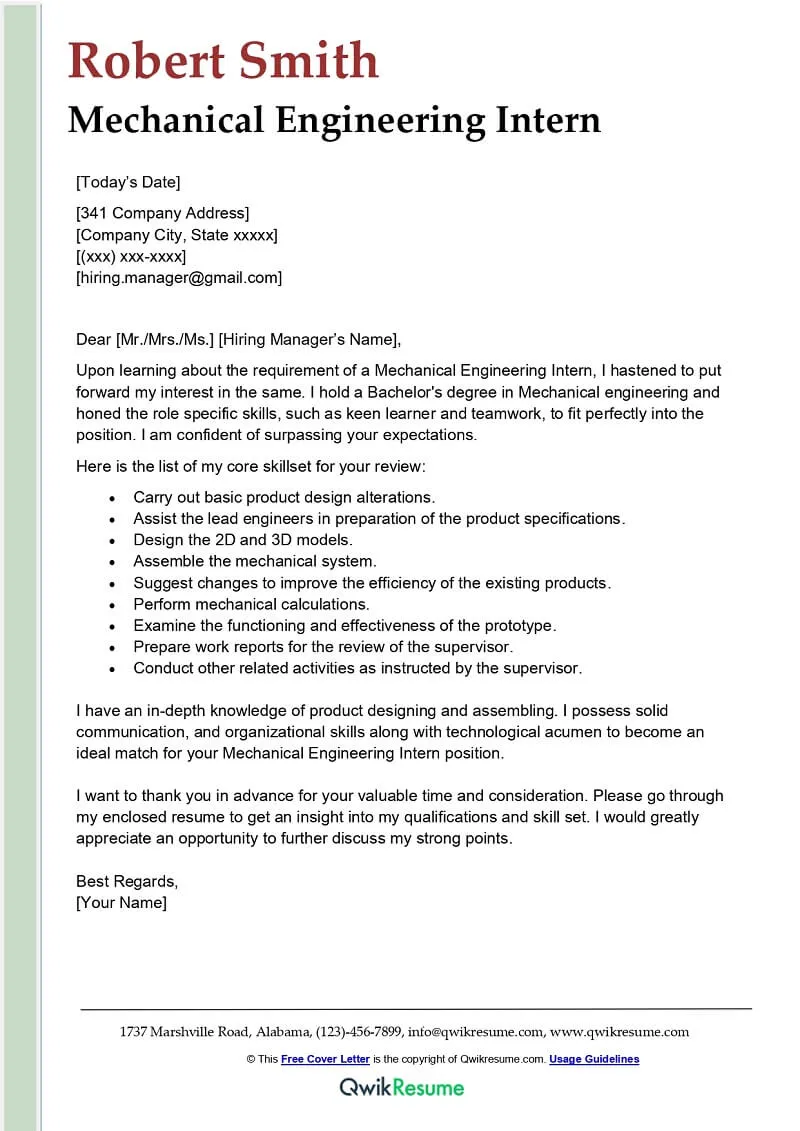Cover Letter for Internship Engineering How To Guide
Securing an engineering internship is a significant step towards a successful career. Your resume showcases your skills and experience, but a compelling cover letter provides the context and personality that sets you apart. This guide provides a comprehensive overview of crafting an effective cover letter for engineering internships, ensuring you make a lasting impression on potential employers. From understanding the importance of a cover letter to providing a practical example, this guide equips you with the knowledge and tools to succeed in your internship applications.
Understanding the Importance of a Cover Letter
A cover letter is more than just a formality; it’s your opportunity to introduce yourself, highlight your key qualifications, and express your enthusiasm for the specific internship. It complements your resume by providing a narrative that connects your skills and experiences to the internship requirements. A well-written cover letter showcases your communication skills, attention to detail, and genuine interest in the company and the engineering field. It’s your chance to make a strong first impression and demonstrate why you are the ideal candidate. Think of it as a conversation starter that encourages the employer to delve deeper into your qualifications.
Why a Cover Letter is Crucial for Engineering Internships
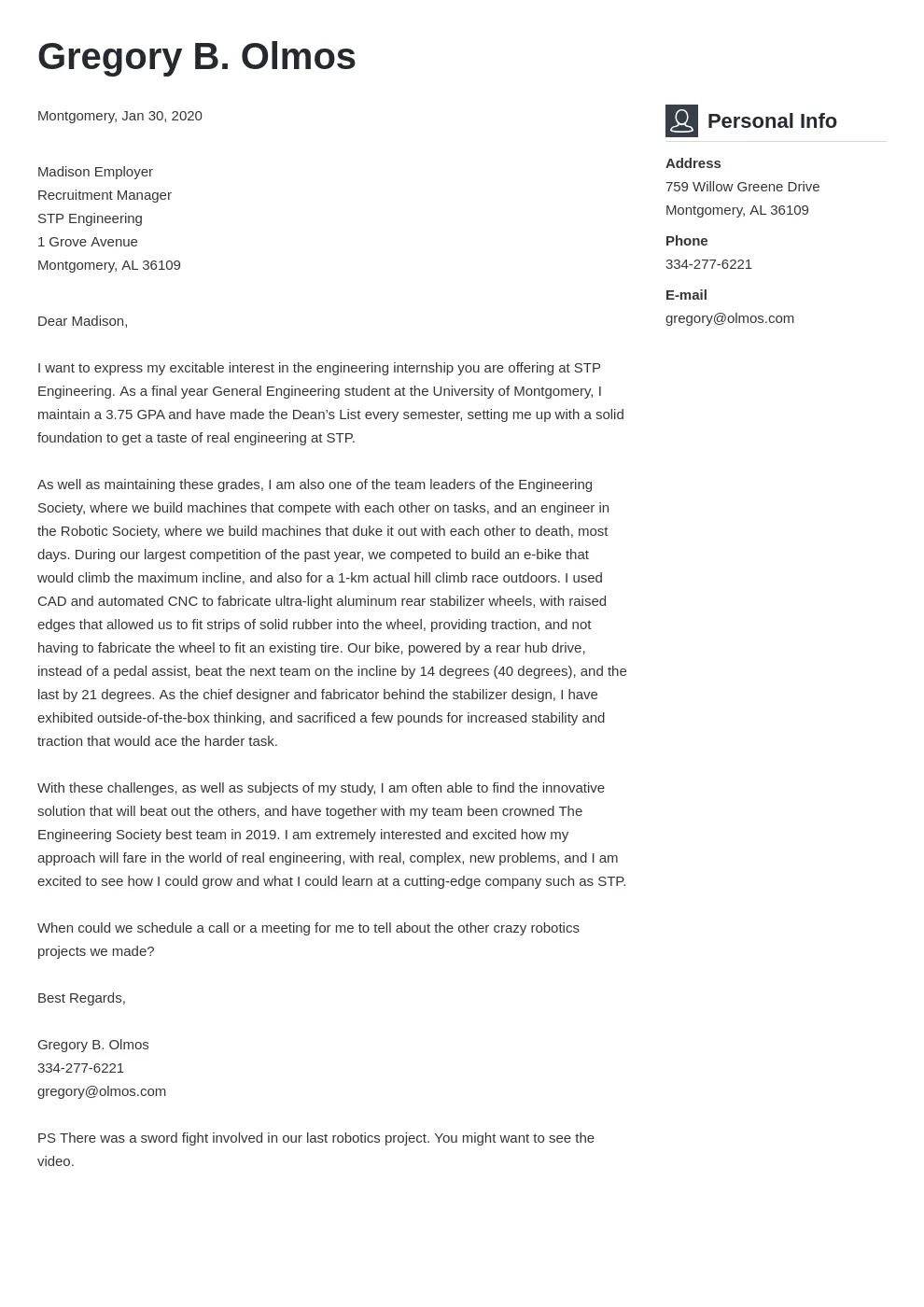
Engineering internships are highly competitive, and a strong cover letter can significantly improve your chances of getting noticed. It allows you to address any gaps in your experience, such as limited professional work, by emphasizing your academic achievements, relevant projects, and technical skills. The cover letter also provides an opportunity to demonstrate your understanding of the company’s mission and values, showing that you’ve done your research and are genuinely interested in contributing to their goals. It allows you to show your personality and communication style, which are vital for any engineering role. In essence, it gives a comprehensive snapshot of you as a potential intern.
Highlighting Your Skills and Experience
Your cover letter should highlight the skills and experiences most relevant to the engineering internship. Start by identifying the key skills and qualifications listed in the internship description. Then, provide specific examples from your academic projects, extracurricular activities, or previous work experiences that demonstrate those skills. Focus on technical skills, such as proficiency in specific software or programming languages, as well as soft skills, such as teamwork, problem-solving, and communication. Tailor your examples to match the specific requirements of the internship and show how your unique skill set aligns with the company’s needs. Make sure to focus on your achievements rather than simply listing your responsibilities.
Key Components of a Compelling Cover Letter
A well-structured cover letter includes several key components. Start with your contact information and the date, followed by the recipient’s information (name, title, company, address). The opening paragraph should grab the reader’s attention and state the position you’re applying for. The body of the letter should highlight your relevant skills and experiences, providing specific examples to support your claims. Quantify your accomplishments whenever possible to demonstrate your impact. Tailor your letter to the specific internship and company, demonstrating your interest and enthusiasm. Finally, close your letter by expressing gratitude, reiterating your interest, and offering your availability for an interview. Each section should flow logically and reflect your professionalism.
Your Contact Information and the Date
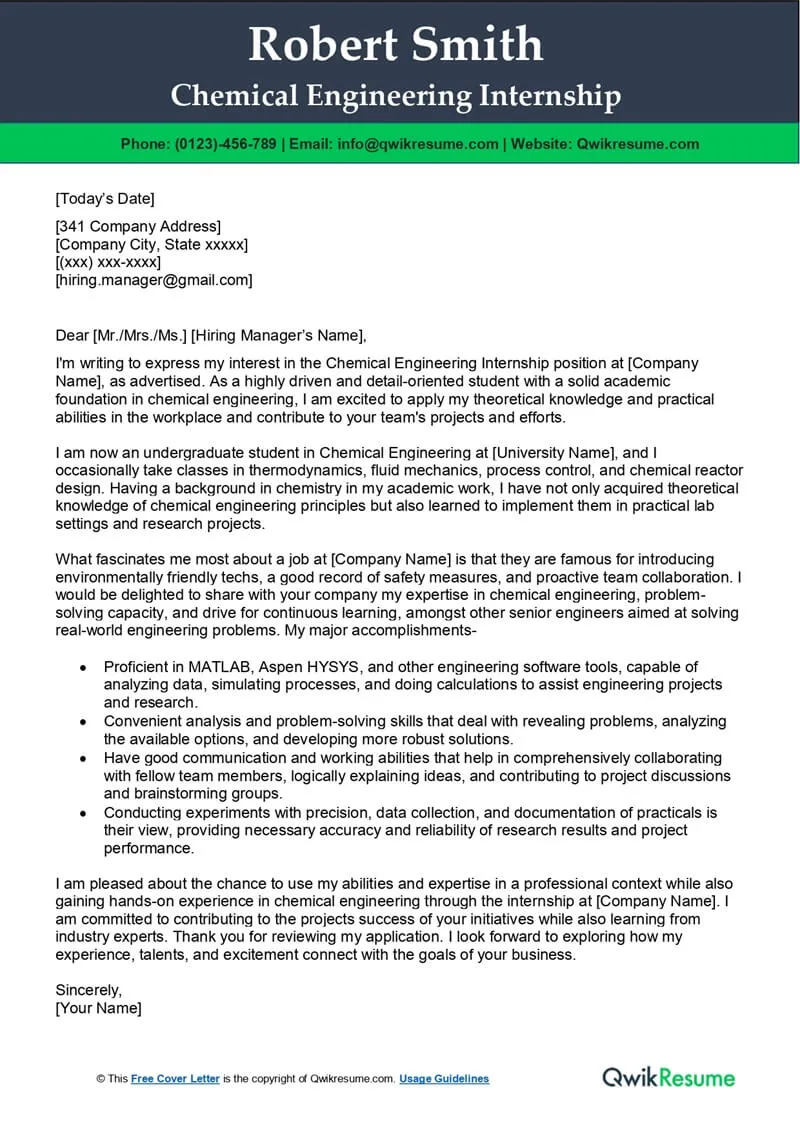
Begin your cover letter with your contact information in the top left corner. This should include your full name, address, phone number, and professional email address. Make sure your email address sounds professional. Following your contact information, add the date. Ensure the date is formatted correctly (e.g., Month Day, Year). This ensures the recipient can easily contact you and know when the letter was written. Double-check all details for accuracy, as even a small mistake can create a negative impression. Proper formatting sets a professional tone from the beginning, signaling your attention to detail.
The Recipient’s Information
Next, include the recipient’s information, usually on the top right corner or slightly below your information. This includes the name of the hiring manager or the person in charge of the internship program, their title, the company name, and the company’s address. Researching the hiring manager’s name is highly recommended; addressing the letter to a specific person demonstrates that you’ve done your homework. If you are unable to find a specific name, using a general salutation like ‘Dear Hiring Manager’ is acceptable. This personalization shows your initiative and respect for the reader’s time.
Crafting a Strong Opening Paragraph
The opening paragraph is your chance to make a strong first impression. Start by stating the position you are applying for. Mention where you found the job posting and briefly explain why you are interested in the internship and the company. Show enthusiasm and a clear understanding of the role. A good opening paragraph should be concise, engaging, and demonstrate your knowledge of the company. Avoid generic introductions; instead, make it clear that you’ve researched the company and are genuinely excited about the opportunity. Aim to grab the reader’s attention and set the tone for the rest of the letter.
Showcasing Your Skills and Achievements
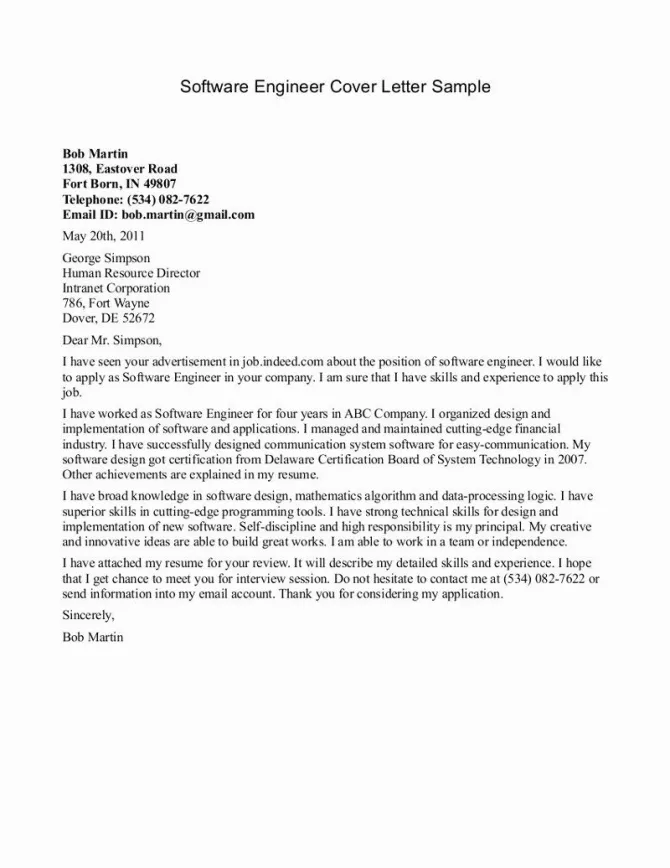
The body of your cover letter should highlight your relevant skills and achievements. Provide specific examples of how you’ve demonstrated these skills in the past. Use the STAR method (Situation, Task, Action, Result) to structure your examples and show the impact of your contributions. Quantify your accomplishments whenever possible. Instead of saying ‘Managed projects’, state ‘Managed three projects, resulting in a 15% reduction in project completion time.’ Tailor these examples to the requirements of the internship, ensuring they match the skills and qualifications listed in the job description. This targeted approach will help you stand out from the competition.
Quantifying Your Accomplishments
Quantifying your accomplishments is crucial for demonstrating the impact of your skills. Instead of saying ‘Improved efficiency’, state ‘Increased project efficiency by 20% through process optimization.’ Use numbers, percentages, and specific data to showcase your achievements. This provides tangible evidence of your abilities and makes your cover letter more compelling. Quantifiable results clearly show your value to the company. Consider the tasks you have performed in previous projects or jobs and how you can attach numbers to them. Quantifying achievements helps hiring managers quickly understand your potential contributions.
Tailoring Your Letter to the Internship
Customize your cover letter for each internship you apply for. Review the job description carefully and identify the key skills and qualifications they are seeking. Modify your letter to highlight your relevant experiences and skills that match those requirements. Research the company’s values, projects, and culture to demonstrate your genuine interest. Addressing the letter to a specific person and mentioning specific projects or initiatives that interest you shows that you’ve invested time and effort. This level of personalization significantly increases your chances of getting noticed. Customization makes you appear more interested in the specific opportunity.
Demonstrating Your Interest and Enthusiasm
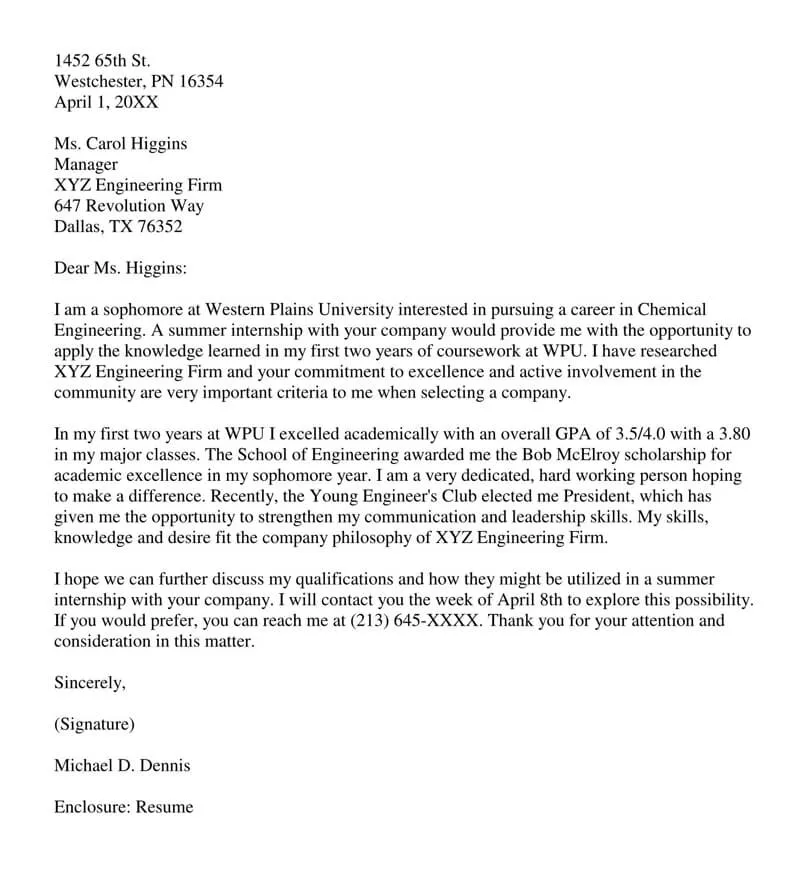
Express your genuine interest and enthusiasm for the internship and the company. Explain why you are excited about the opportunity and what you hope to gain from it. Mentioning specific aspects of the company’s work that appeal to you demonstrates that you’ve done your research and are truly interested in the role. This could involve discussing their innovative projects, their company culture, or their commitment to sustainability. A sincere and enthusiastic tone can make a lasting impression. Show that you are eager to contribute to the team and learn from experienced professionals.
Addressing the Internship’s Requirements
Carefully review the internship description and address each of the requirements listed. This demonstrates your attention to detail and ensures that you’ve provided all the necessary information. If the description mentions specific skills, software proficiency, or experience, make sure to highlight those aspects in your cover letter and provide relevant examples. If there are any gaps in your experience, address them proactively by explaining how you’ve acquired the necessary skills through other means, such as academic projects or self-study. Align your qualifications with the job requirements to show you’re a great fit for the role.
Closing Your Cover Letter Effectively
Your closing paragraph should reiterate your interest in the internship, express gratitude for the reader’s time, and offer your availability for an interview. Thank the hiring manager for considering your application and express your enthusiasm for the opportunity to discuss your qualifications further. Provide your contact information again and mention that you are available for an interview at their earliest convenience. A strong close leaves a positive final impression and encourages the reader to take the next step. Ensure it ends on a positive and professional note.
Expressing Gratitude and Offering Availability
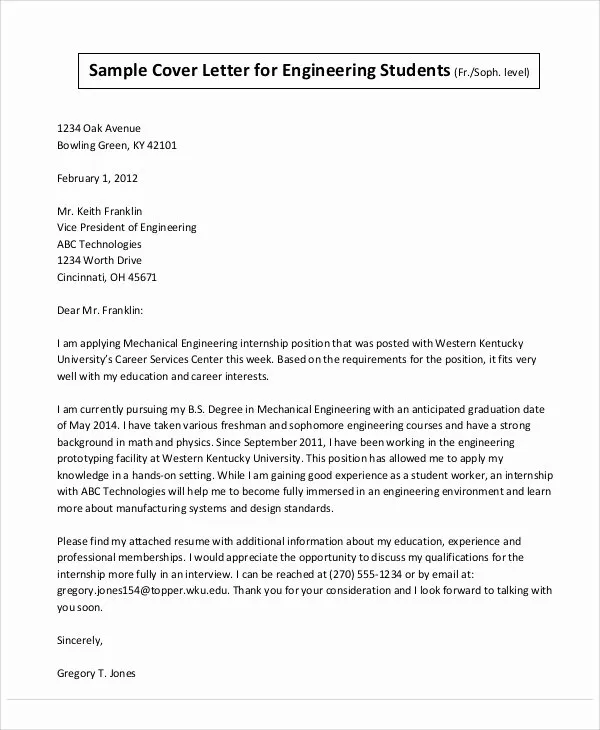
In your closing paragraph, express your gratitude to the hiring manager for considering your application. Thank them for their time and the opportunity to be considered for the internship. Reiterate your interest in the role, and express your availability for an interview. Providing a specific way to contact you again ensures that the hiring manager can reach you easily. Ensure the tone remains professional and enthusiastic, reinforcing your genuine interest in the opportunity. Offering availability demonstrates your commitment to the application process.
Proofreading and Editing Your Cover Letter
Proofreading and editing are essential steps in the cover letter writing process. Errors in grammar, spelling, or formatting can create a negative impression, regardless of your qualifications. Carefully review your cover letter for any mistakes, and ask a friend, professor, or career counselor to review it as well. Pay close attention to sentence structure, clarity, and word choice. Ensure the tone is professional and that your writing style is clear and concise. Proofreading ensures that your cover letter is polished and reflects your attention to detail. It gives the hiring manager confidence in your ability to handle professional communications.
Common Mistakes to Avoid
Avoid common mistakes that can hurt your application. These include generic cover letters that are not tailored to the specific internship, typos and grammatical errors, and using overly informal language. Do not simply reiterate your resume; use the cover letter to provide context and expand on your experiences. Avoid clichés and overly enthusiastic statements that may seem insincere. Sending a cover letter without a personalized greeting shows a lack of effort. Make sure to avoid any negative statements or complaints about previous employers. Focus on your qualifications and enthusiasm for the opportunity.
Formatting Your Cover Letter for Readability
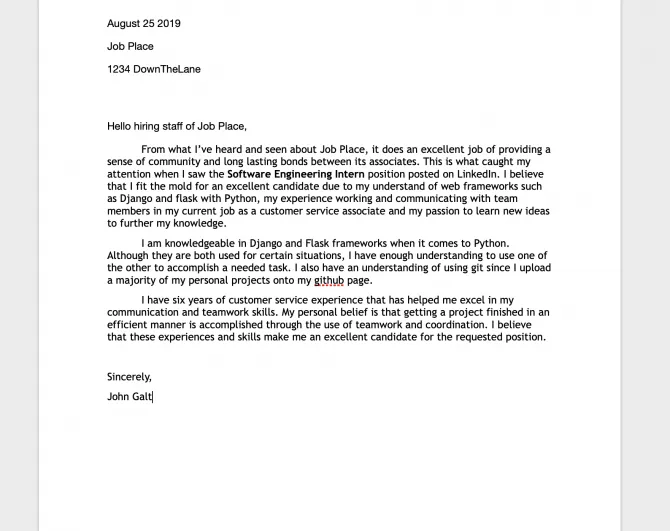
Proper formatting makes your cover letter easy to read. Use a professional font, such as Times New Roman, Arial, or Calibri, and maintain a consistent font size (typically 11 or 12 points). Use single-spaced lines and add a blank line between each paragraph. Keep your cover letter concise, ideally within one page. Use clear headings and bullet points to break up the text and highlight key information. Proper formatting makes your cover letter visually appealing and helps the reader quickly grasp the most important information. Create a clean and professional appearance to demonstrate your attention to detail.
Using a Professional Tone and Style
Maintain a professional tone and style throughout your cover letter. Use formal language and avoid slang, contractions, and informal expressions. Be respectful and polite in your communication. Focus on highlighting your skills, experiences, and enthusiasm for the opportunity. Use positive language and demonstrate a can-do attitude. Ensure the tone aligns with the culture of the company you are applying to. Your professional tone creates the right impression, making your application appear trustworthy. Your communication style demonstrates your understanding of professional decorum.
Cover Letter Example for Engineering Internships
Here is a sample cover letter to help you understand the application of the information mentioned. Remember to replace the bracketed information with your own details and tailor it to the specific internship. [Your Name] [Your Address] [Your Phone Number] [Your Email Address] [Date] [Hiring Manager Name] [Hiring Manager Title] [Company Name] [Company Address] Dear [Mr./Ms./Mx. Last Name], I am writing to express my enthusiastic interest in the Engineering Internship position at [Company Name], as advertised on [Platform where you saw the advertisement]. As a highly motivated [Year] in [Major] at [University Name], with a strong foundation in [Relevant Skills, e.g., CAD, MATLAB, SolidWorks], I am eager to apply my knowledge and contribute to your innovative projects. In my [Academic or Project Experience, e.g., coursework, project work], I successfully [Quantifiable Achievement]. My project experience in [Specific Project] allowed me to develop expertise in [Skills]. I am also eager to learn from experienced engineers and contribute to the success of [Company Name]. Thank you for considering my application. I look forward to the possibility of discussing my qualifications further. Sincerely, [Your Name]. This template serves as a basis, and you should always tailor it to the specific requirements of each position.
